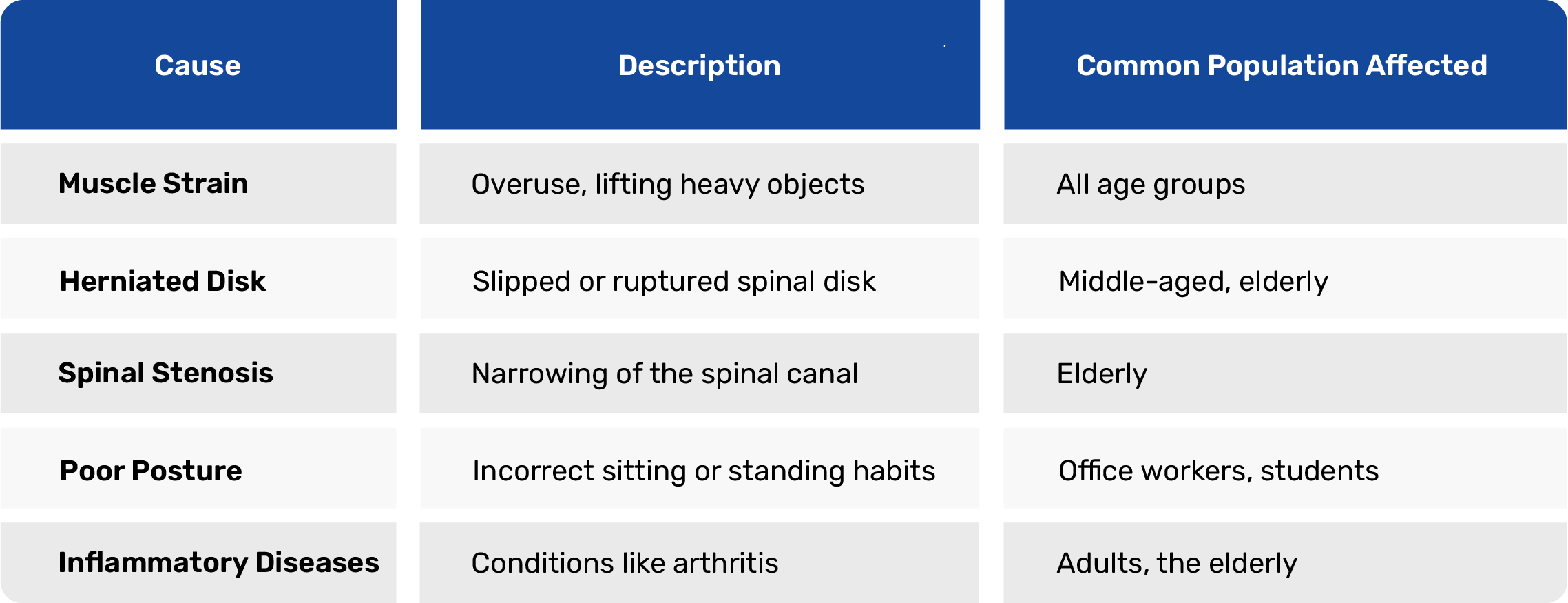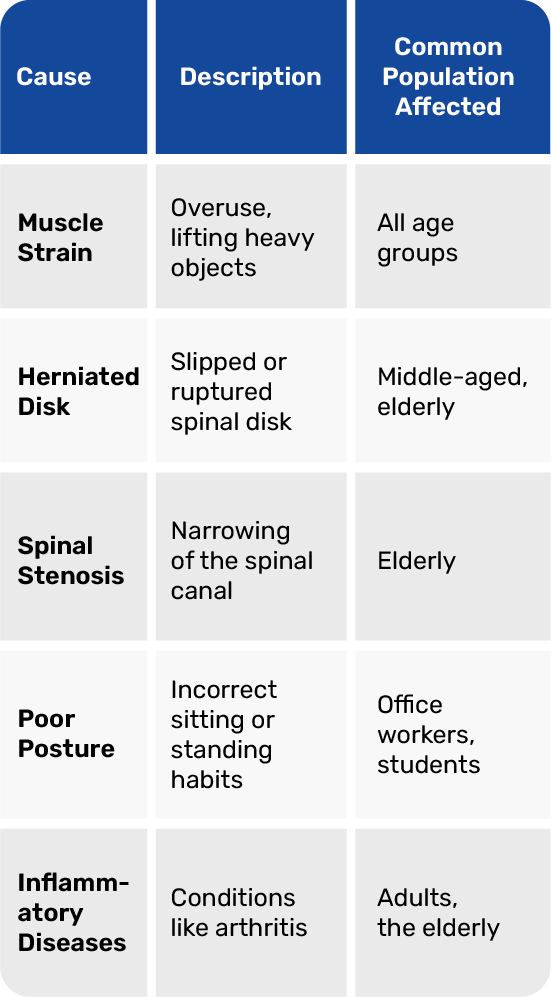
Find out about the different types of healthcare professionals who can help you with back pain. These range from primary care doctors to spine specialists.
Learn how to tell the difference between acute and chronic back pain. This will help you know when to consult a specialist.
See when you should visit a primary care doctor or a spine surgeon. Explore treatment plans that may include physical therapy and other advanced methods.
Watch for important signs, such as severe pain and unexplained weight loss. These could indicate a serious condition and may require prompt medical attention.
Get easy tips on how to get ready for a doctor’s visit. This helps you get the best diagnosis and care.
Find answers to common questions about treating and managing back pain effectively.
Living with back pain, no matter if it comes and goes or never stops, can make it hard for you to do things and enjoy life. Everyday, simple tasks can turn into hard work. You may want relief, but not know where to start. This guide is designed to help you understand your options for medical care in India. It discusses various types of back pain and identifies the healthcare professionals who can provide the most effective treatment. This easy consultation guide is your first step toward overcoming pain and enjoying life again, one day at a time.
Back pain can happen for many reasons. It may be caused by a minor strain or more serious issues with your nerves or spinal cord. It is essential to identify the underlying cause as soon as possible. This helps make a good treatment plan that is right for you.
If you do not receive help, lower back pain or nerve problems can worsen. This can compromise your ability to move and maintain spine health. If you can spot the signs early and understand their significance, you can consult a doctor before the condition worsens. This will help you manage your back pain and maintain the health of your spinal cord.
Back pain often stems from lifestyle choices and common health conditions prevalent in India. Activities such as sitting for extended periods or lifting heavy objects can put stress on your back. By understanding what causes back pain, you can take steps to prevent it from worsening. Sometimes, back pain comes from health problems such as a herniated disk or issues like spinal stenosis as people get older.


These points demonstrate the importance of maintaining good posture, taking care of your body, and being aware of early signs of pain before it becomes more challenging to treat. When you spot signs of back pain, spinal stenosis, or a herniated disc and address these health conditions early, you increase your chances of better long-term health.
While a lot of back pain gets better on its own, there are times when you should see a doctor. Severe back pain, problems with your nerves, or unexplained weight loss can be signs of a serious problem.
Your doctor will review your medical history and inquire about any nerve-related issues you may have. They will also want to know about any changes in your bowel or bladder function. This helps them understand what may be causing your back pain.
If your pain lasts for more than a few weeks or gets worse even after you try home remedies, it’s very important to talk to a healthcare professional. This way, they can help you quickly and stop any issues that could hurt your health.
For mild back pain, you can use home remedies such as ice packs or simply rest. These things help with some types of discomfort. However, it is essential to recognize when you require more assistance than this.
If your back pain worsens, if it starts after an injury, or if a new back injury persists and does not improve, it’s time to consult your primary care provider. Going for help early can stop the pain from getting worse. It also helps you heal more quickly because your provider can create a treatment plan tailored to your needs.
Some symptoms require immediate medical attention to prevent permanent harm. Do not wait if you notice these signs:
Go straight to the emergency room if you have any of these symptoms. Quick action may lower the risk of you having serious problems later.
Arriving prepared makes your medical visit run more smoothly. It helps your doctor spend more time looking at your back pain.
Think about doing these things before you go to your appointment:
When you bring this information, your doctor can quickly review your medical history, conduct a physical exam, and create a treatment plan tailored to you. This helps you get better care for your back pain.
General physicians know how to check and care for back pain, whether it’s a minor injury or problems with nerves.
They use your medical history as a guide. You will undergo reflex tests, strength checks, and receive an assessment of your physical limitations in daily activities. If needed, the doctor may order an X-ray to determine if the bones are in alignment or to identify other potential causes.
If you require additional care, your general physician will assist in scheduling appointments for you. You may want to consult a physiotherapist, rheumatologist, or spine specialist for further guidance on a personalized plan to manage your back pain.
When conservative management is not practical or symptoms worsen, primary care doctors typically make referrals for advanced care.
In severe cases, when nerve problems or visible changes in the spine or bones are present, referrals to spine specialists or orthopaedic surgeons are often necessary. If pain gets worse and does not respond to simple treatments, you may need expert help for special procedures, like steroid injections or tests.
By working together with doctors from various fields, your healthcare provider creates a treatment plan that utilizes advanced techniques without compromising your access to the right care.
Based on what the doctor finds during your first visit, various specialists in India will take care of different aspects of back pain.
Orthopaedic surgeons specialize in treating bone and muscle disorders. Neurologists specialize in conditions related to the nervous system. Rheumatologists help manage pain associated with body swelling. Pain management specialists can help provide long-term relief from the back pain you have been experiencing for a while. A good checkup helps direct you to the right expert, ensuring you receive the best care for your specific type of back pain.
Orthopaedic surgeons focus on helping when back pain is caused by things that affect the bones, ligaments, or spinal disks. You might hear about these doctors if you have problems like herniated disks or spinal stenosis.
If this pain requires careful treatment or you need a specialized scan, such as an MRI, you may be referred to an orthopaedic spine surgeon. Early on, there are other ways to help alleviate back pain. Some of these include physical therapy, and you may sometimes need support tools. These are important steps at the start.
But if you have a serious problem and nothing else works, surgery may be needed. These surgeries help realign your spine or relieve pressure on specific areas. That’s why having these doctors is good for treating tough back issues.
Neurologists play a significant role in finding answers for back pain resulting from nerve damage or problems in the spinal cord.
If you experience numbness, a tingling sensation, or difficulty moving, a doctor may refer you to a neurologist. The neurologist will assess your physical health and use tests, such as MRIs, to examine your condition more closely.
They mainly look for nerve irritation and can suggest simple treatments or give you medicine to help your nerves work better. This can help alleviate problems and reduce pain. Neurology gets involved when nerve tests reveal the cause of the pain, and when a personalized medical plan is needed.
Rheumatologists help people who have problems caused by the body’s immune system or inflammation, such as arthritis that makes moving the back difficult.
Knowing small triggers of inflammation is very important. It can help prevent chronic back pain from worsening. Things that help with blood flow, such as medications tailored to your blood’s needs, can help keep your body functioning without requiring significant lifestyle changes.
They make treatment plans that lower stress in the spine. They also tell you when to come in for check-ups if your pain gets worse and more tests are needed.
Chronic back pain needs careful care from pain management specialists. They know how to help with more than just basic treatments.
They use treatments such as transcutaneous electrical nerve stimulation (TENS) to help control pain signals. They also use special injections to target spots where nerves cause pain. These specialists work with rehabilitation doctors. Together, they help people improve their bodies, nerves, and minds.
Pain management specialists play a crucial role in discovering new methods to provide relief. They help people choose between basic and surgical options to achieve lasting comfort.
In the end, dealing with back pain can be hard. However, knowing which type of doctor to see is crucial for receiving the right care. Your journey could start with a primary care doctor. They check your back first and may suggest you see a specialist if needed. Some specialists, such as orthopaedic surgeons or neurologists, help with specific types of back problems. Every one of these doctors has a part in your treatment.
It’s helpful to know when to visit a doctor and how to prepare for that visit. This can help you have more control over your health. Remember, you are not in this by yourself. Consulting with the right type of doctor can help you manage your pain and recover more effectively. If you continue to experience back pain, schedule an appointment today. This is the first step towards feeling good again.
If you have chronic back pain, it is best to see a spine specialist, a pain management specialist, or an orthopaedic surgeon. The right one for you depends on your medical history, symptoms, and your primary doctor’s recommendation. Consulting with one of these experts will help ensure you receive a treatment plan tailored to your needs. Their knowledge and training enable them to provide you with the best care for your back pain.
Yes, most back pain cases can be alleviated with simple steps. Physical therapy, home remedies such as applying ice, and over-the-counter pain relievers often provide significant relief. Surgery is only necessary if these methods do not alleviate the long-term pain or nerve trouble.
It’s a good idea to start with a primary care doctor. They will assess your symptoms and may refer you to a physical therapist. The physical therapist can demonstrate exercises or provide other treatments. If your pain does not get better or you need more checks, you might need to see a specialist who can help even more.
Your doctor may recommend a few tests to determine the cause of your back pain. These can be X-rays to look for broken bones. You may also undergo MRI scans to examine the soft tissues inside your back, such as muscles and discs. Sometimes, your doctor might use CT scans, too, as they give clearer pictures of your back. Blood tests can help the doctor see if you have any infections or swelling in the body. All these tests help the doctor find what is really causing your back pain.
To find the right doctor for your back pain, consider their area of focus, experience, and approach to treating back pain. Read what other patients say about them. You can also consult with your primary care physician to get their ideas. Trust your gut feeling. It is essential to choose a doctor you feel comfortable with. This can help you get better care for your back pain.

Pioneering Interventional Pain Management
Delhi | Faridabad | Gurugram | Ghaziabad | Noida | Lucknow | Jaipur | Mumbai
© 2025 Nivaan. All Rights. Reserved